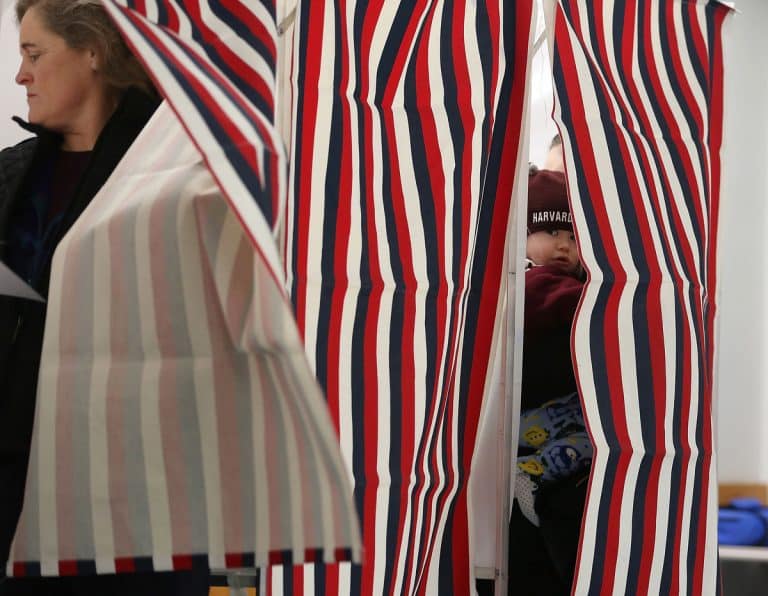
Image by Joe Raedle.
Voting Is an Exercise in Empathy
A few weeks ago, I posted a graphic on my Facebook page:
“Voting is the expression of our commitment to ourselves, one another, this country, and the world.”
I thought of it as an earnest call to action, and a simple way to show people with whom my work resonates how much I care about voting.
The responses surprised me. Many users argued against what I wrote, asserting that choosing not to vote is a valid choice and driven by a definitive set of beliefs that aren’t supported by party politics. Others chimed in using the word “evil” more than once — politics was categorically referred to as such in one case, though, so was not voting in another. I was also told that my emphasis on voting had aggressive undercurrents, and that participating in this election was against the tenets of compassion and mindfulness.
Undeniably, tensions during this election cycle have been high. There seem to be a greater number of personal attacks this year — between the candidates, party officials, news media outlets, and voters. I don’t deny that there are issues with electoral politics in America — many discouraging and alienating issues. But all that said, I was surprised to see how misunderstood my intentions were in encouraging people to vote.
I believe voting is a great privilege and that civic participation can be thought of as an expression of mindfulness and compassion. In fact, voting seems to stem from one of the cornerstone visions of lovingkindness: we all matter, we all count, and we all deserve to be happy, peaceful, and safe. Of course, there are terrible flaws in the system: the floods of money, the terrible pretense in the theater of politics. But choosing to vote also doesn’t have to bring with it a full sense of acceptance of the system. Think about the fact that there are fewer polling locations available in poor neighborhoods, or those primarily inhabited by people of color. These manipulations are dehumanizing, and they happen frequently. We might choose to vote by keeping in mind those brought down by the system. That’s precisely one of the reasons to vote.
No matter how divorced we feel from current events, or even if we feel downright removed from the system, those who hold public office (and the policies they choose to institute) make a real difference. We may not feel the difference directly, but it’s actually there in many places. I was able to go to college because of a New York State Regents’ Scholarship. Many years later, a friend told me her life had been saved by changes in health policy that enabled her insurance company to reimburse treatment for her son’s mental illness in parity with a physical illness. I learned today that a friend of one of my students, who recently came out as transgender, discovered that his health insurance company would cover the cost of his top surgery — a change that will enable him to live life as his authentic self, and that he believes will save his life.
It doesn’t take an extensive analysis for any of us to acknowledge how many people are affected by the law, or by those making it. These examples are just proverbial drops in the bucket, and yet they are also big life changes on an individual level — for me, for my friend and her son, for my student’s friend, and for my student. Those life changes matter.
The system is terribly imperfect and won’t become perfect overnight. But what if we try to think specifically about the students who want to go to college, the individuals suffering from mental illness who need health coverage, and transgender folks who want surgery but who need the support of health providers and insurance companies? We can vote on behalf of any of these people, no matter how removed we feel from the decisions being made by those who are in office.
I understand the caution. I remember feeling troubled by an experience that happened to me when I was at a conference at a university a few weeks before the 2004 election between Kerry and Bush. As we were closing the conference on Sunday, a university staff member said in the closing circle, “At my church, we’re told that to be a good Christian, we have to vote for George Bush.”
She was already distressed that she had chosen not to be at church that day, and was even worried that she was considered suspect for working at a secular university. I don’t believe that it’s anyone else’s right to place moral value judgments on another person’s politics, especially not in relationship to spirituality. But I do think that there is a way to connect spirituality and voting.
Voting is about taking responsibility as a human — to oneself, to other humans, and to the world. I would never tell anyone who to vote for this election cycle, or in any election cycle. But I stick to my original intention to say, very publicly and in a totally non-partisan way, that I think everyone should vote. And through choosing to vote, we can acknowledge how connected our lives really are — if we allow ourselves to see it that way.
Fritz Perls, the co-founder of gestalt therapy, famously said,
“Boredom is lack of attention.”
And whether you’re bored by the election, or shut down to it because of anxiety or frustration, paying attention is the solution. We can pay attention to the privilege of our right to vote. We can pay attention to the policy issues that are at stake. We can pay attention to disenfranchised populations whose lives will be most affected by the outcome. We can pay attention to what’s in front of us at each moment — the world we live in, and all of the people whose lives are inextricably connected to our own.

Share your reflection